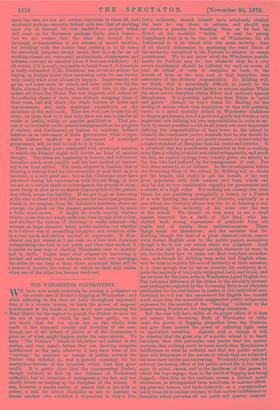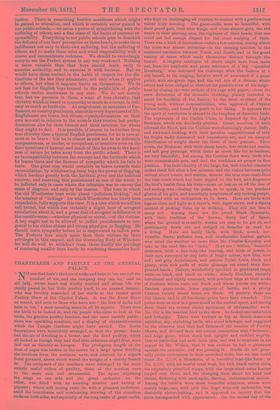THE WINCHESTER CONTROVERSY.
Whave now ample materials for passing a judgment on the recent case of Prefect's flogging at Winchester ; and while adhering to the view we have throughout expressed, that it is a vicious system to leave the power of corporal punishment in the hands of boys at all, and condemning the A' Head Master for his neglect to punish the Prefect at once for the act of excess of which he had been guilty, we do not doubt that far too much has, on the whole, been made of the supposed cruelty and brutality of the case, though not of the failure of justice or of the illustration it gives us of what might happen under the same system. We have "The Victim's" letters to hisfather and mother in the matter, and very manly letters they are, showing complete indifference to the pain, whatever it may have been, of the " tunding " he endured, no vestige of malice towards the Prefect who inflicted it, and a general contempt for the martyrdom-heroics of the situation which does him great credit. It is pretty clear that the transgressing Prefect, though irritated at first by the defiance of Prefectural authority, had no intention of transgressing the law, and was chiefly intent on keeping up the discipline of the school. It was, however, a simple matter of justice that a lad with so ardent a zeal for school discipline as not to hesitate to thrash another who exhibited a disposition to defy a Pre-
feet's authority, should himself have sedulously studied the laws he was about to enforce, and should pay as severe a penalty for breaking them as he had in- flicted on his so-called "victim." If zeal for purely disciplinary laws is to be the rule of Winchester, let all deficiencies in it be visited with the same severity ; least of all should deficiencies in mastering the exact limits of the authority committed to the Prefects be allowed to escape punishment. We do not know what the Winchester punish- ments for Prefects may be ; but whatever they be, a very severe punishment should be inflicted for such an excess of zeal on behalf of rules of discipline as leads to the breach of laws at the very root of that discipline, laws restrictive of the Prefects' responsibility. Dr. Ridding will, we think, find it exceedingly difficult to justify to the Governing Body his complete failure to enforce against White the same severe discipline which White had enforced against Macpherson. It is probably quite true that White is "good and gentle" (though he won't thank Dr. Ridding for the feeling of nausea which that description of him will probably excite in a mind carefully drilled by Winchester traditions to despise gentleness), but if a good and gentle boy breaks a very important rule defining his own responsibilities in order to en- force by severe penalties a rule at all events not more important defining the responsibilities of boys lower in the school to himself, the commonest justice demands that he also should be severely treated by a good and gentle master,—indeed tried by a higher standard of discipline than his junior and inferior. It is admitted that his punishment amounted at first to nothing more than a rebuke, to which was added subsequently, and much too late, an explicit apology (very frankly given, we admit), to the boy who had suffered by his transgression of rule. For this there seems to us no defence. In the investigation before the Governing Body of the school, Dr. Ridding will no doubt get the benefit, and ought to get the benefit, of his very great popularity with both masters and boys, which can only be due to very considerable capacity for government and a morale of a high order. But nothing can exempt him from blame for not punishing exemplarily a breach by a Prefect of a rule limiting the authority of Prefects, especially in a case where the Prefect's offence was due to so burning a zeal for asserting the authority of his order over the rest of the school. We should be very sorry to see a head master removed for a _fault of this kind, who has elicited such strong expressions of gratitude from old pupils and of loyalty from assistant-masters. These things speak for themselves ; and the accident that Dr. Ridding, though the head of a great classical school, cannot write decent English even to the public papers, anomalous though it be, is not one which alters our judgment. Lord Nelson was said to be always sea-sick whenever he went to sea, but he knew how to make our fleet victorious neverthe- less; and though Dr. Ridding may write bad English when- ever he tries to explain his acts of authority or their omission, it is clear enough that he can so exercise his authority as to make the majority of his pupils write good Latin and Greek,. and (as we trust by this time, even in Winchester,) good English too. The ludicrous deficiency of his letters in the scholarly element may perhaps be regarded by the Governing Body as an adequate retribution for his real failure in justice in this individual case. Certainly he will feel the amusement his English has created much more than the somewhat exaggerated public indignation expressed for the severity of the " tunding " inflicted by the transgressing Prefect on the transgressing commoner. But the case will have failed of its proper effect, if it does not induce the Governing Body of Winchester to with- draw the power of flogging altogether from the Prefects, and give them instead the power of inflicting light tasks or equivalent penalties. Against such a change it will be objected that the great aim of a public school is to teach hardiness, that this particular case proves that the system answers, that nothing could be more manly than Macpherson's indifference to what he suffered, and that our public school- boys will deteriorate if the system to which they are subjected becomes more tender and enervating. We should reply that the salutary hardening effect of the public-school life is due vastly more to moral causes, and to the hardiness of the games in which the boys engage, than to the habit of flogging and being' flogged,—that this, on the contrary, causes a distinct moral obtuseness, as distinguished from manliness, in matters affect- ing personal honour, and leads indirectly, as a correspondent justly remarks in another column, to that curious indifference to brutality which pervades all our petty and quarter sessions'
justice. There is something besides manliness which might be gained in education, and which is certainly never gained in our public schools,—we mean a power of sympathising with the suffering of others, and a fine sense of the limits of personal re- sponsibility. Everything in our public schools goes to diminish the delicacy of our boys' perception on these heads, to make them indifferent not only to their own suffering, but the suffering of others, and to make them seize and wield responsibility with a coarse and inconsiderate rudeness. We should be exceedingly sorry to see the Prefect system in any way weakened. Nothing is more valuable than that boys should learn early to exercise authority, and to exercise it with decision. But we would have them trained in the habit of respect for the dis- tinctions of the law they administer, not only when it applies to others, but when it imposes limits on themselves. We do not fear for English boys trained in the public life of public schools undue tenderness in any case. We do not merely fear, but we perceive in them, a want of true chivalry, that chivalry which is based in sympathy as much as courage, in deli- cacy as much as fortitude. As magistrates, as members of Par- liament, as country gentlemen, almostin every department of life, Englishmen are brave, but obtuse,—pachydermatous on their own account in relation to the wounds they receive, but pachy- dermatous also for their friends and their inferiors, for whom they ought to feel. It is possible, of course, to be further from true chivalry than a typical English gentleman, for he is sure al- most to be brave ; but he is almost as sure not to be delicately compassionate, or tender, or scrupulous, or sensitive even on the finer questions of honour, and much of this he owes to the hard- ness of nature he takes away from the public school. There is no incompatibility between the courage and the fortitude which he learns there and the fineness of sympathy which he fails to learn. One great step would certainly be taken towards their reconciliation, by withdrawing from boys the power of flogging, which hardens greatly both the habitual giver and the habitual receiver, and reserving this punishment as one of the worst, to be inflicted only in cases where the intention was to convey the sense of disgrace, and only by the master. The tone in which the old Winchester boys write about "judicious kicking," and the number of "lickings " for which Winchester has lately been remarkable, fully supports this view. It is a tone which we will not call brutal, but which has certainly a slight tone of arrogant satisfaction about it, and a great deal of arrogant indifference to the sensitiveness,—whether physical or moral,—of the victims. A boy ought not to be allowed to inflict punishments so con- genial to his rather obtuse and strong physique, as flogging. He should learn sympathy before he is empowered to inflict pain. The Prefects lose much more than their victims by their privileges in this respect, and the Governing Body of Winches- ter will do well to withdraw from them finally the privilege of rendering smaller boys hardy by rendering themselves hard.



































 Previous page
Previous page